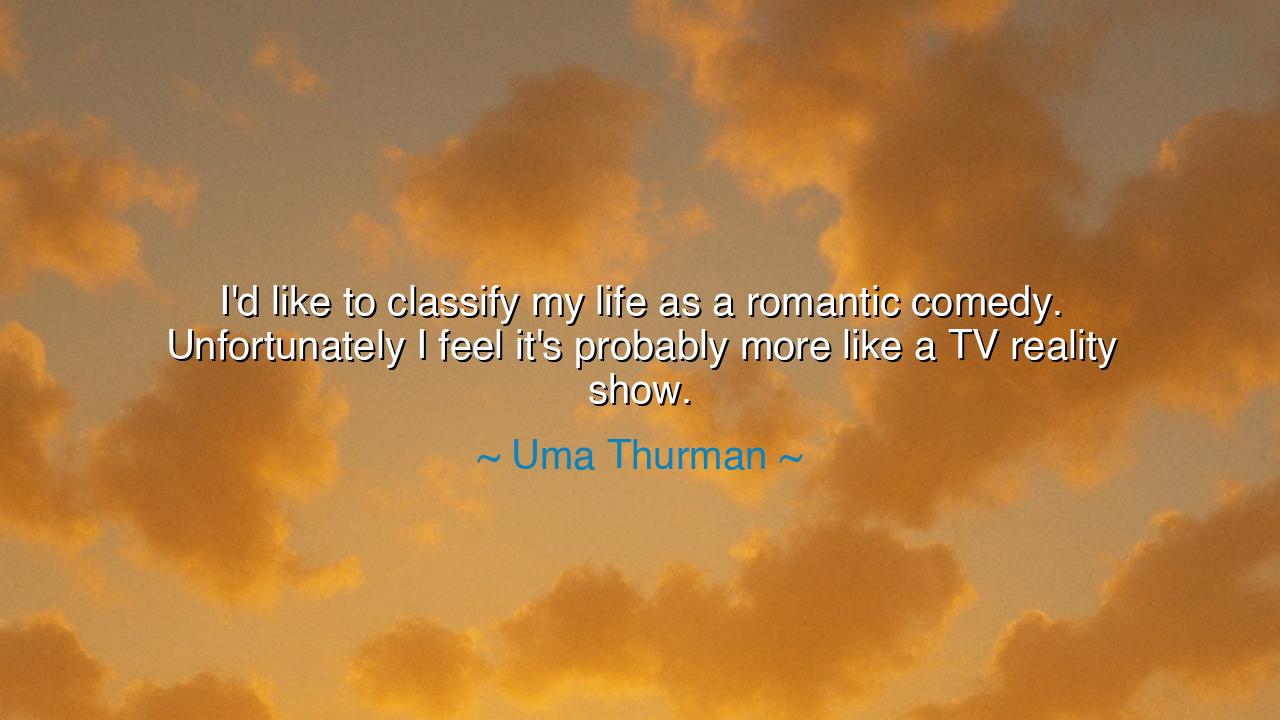
I'd like to classify my life as a romantic comedy. Unfortunately
I'd like to classify my life as a romantic comedy. Unfortunately I feel it's probably more like a TV reality show.






Listen closely, O seekers of wisdom, and consider the words of Uma Thurman, who reflects upon the nature of her life with a playful yet poignant observation: "I'd like to classify my life as a romantic comedy. Unfortunately I feel it's probably more like a TV reality show." In these words, she reveals the tension between dreams and reality, between the life we imagine for ourselves and the unpredictable, often chaotic, nature of the world we live in. A romantic comedy, with its idealized love stories, delightful mishaps, and happy endings, is a tale many wish to live—a life filled with charm, serendipity, and joy. Yet, as Thurman humbly acknowledges, the truth of her existence, like that of many others, may feel more akin to the messy, unfiltered world of a reality show, where moments of grace are often overshadowed by drama and the constant scrutiny of others.
Consider, O wise ones, the allure of the romantic comedy. It is the genre that paints love as a perfect, often humorous, dance between two souls destined to be together. The protagonists face obstacles—often caused by their own flaws—but eventually overcome them with wit, charm, and the deep connection they share. The world they inhabit is full of whimsy, where the rules of the ordinary world do not apply, and true love triumphs against all odds. This idealized vision of life, though deeply appealing, often clashes with the reality of human experience, which is filled not with neatly packaged love stories, but with complexity, uncertainty, and the constant pull of expectations.
Thurman’s comparison between a romantic comedy and a reality show brings into focus the modern struggle between what we desire our lives to be and what they actually are. In the age of television and social media, life is often depicted not in its deep, quiet moments but in its loudest, most dramatic expressions. The reality show is a modern reflection of this—an exaggerated, often manufactured version of life, where the mundane becomes spectacular through the lens of constant exposure and judgment. In such a world, the genuine and romantic often seem out of place, overshadowed by the drama and spectacle that demand attention. Thurman’s words speak to the discrepancy between the life we hope for and the life that is often thrust upon us, one where the complexities of our real emotions and experiences become fodder for the world to consume.
Let us turn our gaze to the ancient world for insight. Consider the tale of Penelope, wife of Odysseus, whose romanticized love for her husband has been immortalized in the epic tale of the Odyssey. Though Penelope’s love for Odysseus is a paragon of steadfast devotion, her life in his absence was anything but a romantic comedy. She faced the reality of being surrounded by suitors, struggling to keep her family and kingdom intact, all while holding onto the hope of her husband’s return. The drama of her existence, filled with tension and uncertainty, was far from the idealized love story often portrayed in the songs of poets. Penelope's tale is a reminder that romantic love, in its truest form, is not always whimsical or lighthearted, but is often a journey fraught with difficulty, resilience, and the ever-present tension between hope and disappointment.
In modern times, we can draw a similar lesson from Marie Curie, whose life was filled with both extraordinary achievement and profound personal sacrifice. Curie, often celebrated as a scientific pioneer, endured great hardship, including the death of her beloved husband, Pierre, and the sacrifices she made in the pursuit of her scientific work. While the world recognized her brilliance, her private life was anything but a polished, romantic tale. Like Thurman, Curie’s life was often more akin to a reality show—complex, challenging, and filled with the struggle of balancing personal dreams with the harshness of reality. Yet, in the face of adversity, she endured—and in her endurance, we see the true nature of romanticism, not in perfect endings, but in the strength to continue despite the chaos.
And so, O seekers, what lesson can we draw from Thurman’s words? It is this: while the world may tempt us to yearn for the perfection of a romantic comedy, with its easy resolutions and idealized love, we must also embrace the realities of life—the unpredictability, the chaos, and the vulnerability that make us human. Life is not a neatly scripted narrative where everything unfolds as we hope, but a complex, often messy journey filled with moments of joy, sadness, and unexpected turns. Yet it is in the embrace of this complexity that we find the true beauty of existence. It is not in perfection, but in the authenticity of our experiences that we truly live.
Take, then, this wisdom into your own heart. Do not be disillusioned by the idealized portrayals of romance or life that you encounter. Recognize that the most powerful and meaningful moments are often not those that are broadcast to the world, but those lived in quiet resilience, in the unspoken love shared between individuals, and in the strength found in the face of adversity. Let your life be a reflection not of what the world expects, but of what you have the courage to create, knowing that the journey—no matter how difficult or unpredictable—is yours to navigate.






AAdministratorAdministrator
Welcome, honored guests. Please leave a comment, we will respond soon